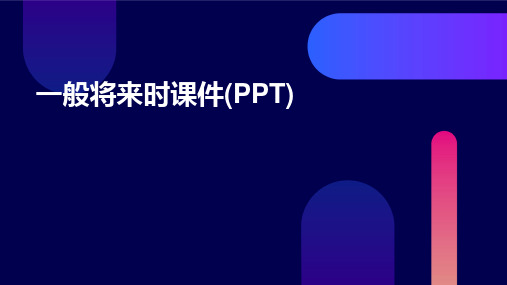Will一般将来时PPT课件
一般将来时(精美课件)Will vs Be going to(共24张PPT )

谢谢
观看
A: Anna is in hospital. B: Yes, I know . I ____________ am going to visit her.
A: let's have a party!
B: That's a good idea! I will invite many friends
主观推测将来可能不发生根据现有情况推断区别22区别11作业写一篇用一般将来时的小作文内容不限字数不低于60词
Will vs Be going to
一般将来时
• 我们要了解:
be doing
does
• 我们要掌握:
be going to will
Will
vs
Be going to
?
PART 1
PART 2
• I will be 18 years old. • I'm going to be 18 years old. • I will be sick. • I'm going to be sick. • It will rain. • It is going to rain.
• I will be 18 years old. • I'm going to be 18 years old. • I will be sick. • I'm going to be sick. • It will rain. • It is going to rain.
A: Anna is in hospital. B: Yes, I know . I ____________ visit her.
区别1
• will:说话当时做决定(会,要)
一般将来时课件(PPT)

“be able to”表示将来有能力做某 事时,使用一般将来时形式,例如“I will be able to help you”。
情态动词如“can”、“may”、 “must”等,在一般将来时中通常直 接加动词原形,例如“I can swim”。
03
一般将来时在句子中的运用
陈述句中的使用
表示将要发生的动作或存在的状态
纠正方法
应使用正确的将来时形式,如 "He will go to the park tomorrow." 或 "He is going to the park tomorrow."
忽略动词变化规则
错误示例
They will play football in the future.(忽略了动词play在将来时中的变化)
纠正方法
在将来时中,应使用正确的助动词或情态动词形式,如 "I will be able to help you with your homework." 或 "I can help you with your homework."
错误示例
He will must finish his work before leaving.(错误地使 用了情态动词must)
作用
用于表示未来的计划、打算、预测、 假设等。
常见表达形式
will + 动词原形
表示将来的动作或状态,如“I will go to the park tomorrow.”(我明天将去公园。)
be going to + 动词原形
表示计划、打算或即将发生的动作,如“I am going to study hard this semester.”(我这 学期打算努力学习。)
一般将来时PPT课件

•一般将来时基本概念•一般将来时结构与用法•一般将来时时间状语及标志词•一般将来时与其他时态对比•一般将来时在各类从句中运用•一般将来时误区及注意事项•总结回顾与拓展延伸目录01一般将来时基本概念定义与特点定义特点表现形式will + 动词原形be going to + 动词原形现在进行时表示将来预测未来计划与安排条件与假设030201使用场景02一般将来时结构与用法主语+ be not going to + 动词原形+ 其他成分主语+ be to not (非标准用法,尽量避免使用) + 动词原形+ 其他成分主语+ will not (won't) + 动词原形+ 其他成分Will + 主语+ 动词原形+ 其他成分?Be + 主语+ going to + 动词原形+ 其他成分?Be + 主语+ to + 动词原形+其他成分?(较少使用,多用于书面语)特殊疑问词动词原形特殊疑问词going to +成分?特殊疑问词to +(较少使用,多用于书面语)注意:在一般将来时的使用中,要注意区分不同语境和表达方式的细微差别,选择合适的结构进行表达。
同时,也要注意与其他时态的区分和联系,避免混淆使用。
特殊疑问句结构03一般将来时时间状语及标志词常见时间状语表示将来的时间状语表示计划或安排的时间状语标志词识别与运用04一般将来时与其他时态对比与现在进行时对比时间指向不同01动词形式差异02使用情境不同03时间基准差异动词形式变化使用情境区别时间范围不同动词形式区别使用情境差异05一般将来时在各类从句中运用在宾语从句中运用01 02定语从句的时态取决于它所修饰的先行词,如果先行词是将来时态,定语从句也使用将来时态。
如果先行词是过去将来时,定语从句则使用过去将来时。
定语从句中表示将来的时间状语有:tomorrow, next year, in the future 等。
06一般将来时误区及注意事项误区二过度使用“will”和“going to”。
一般将来时课件ppt(共17张PPT)

Jim going to
afternoon?
in the playground tomorrow
4. .Jim is going to play football in the playground tomorrow afternoon.
Jim going to play football tomorrow afternoon?
2)在浊辅音和元音后读/d/.
一般过去时, 要用动词过去式. Jim is going to play football in the playground tomorrow afternoon.
Jim is going to play football in the playground tomorrow afternoon. ⑵are变为were。
there were many beautiful flowers there. 一般将来时表示将来某个时间要发生的动作或存在的状态常与表示将来的时间状语连用
⑴am ,is变为was。
So she They to read some books.
What did they do in the park? 1)在清辅音后读/t/ .
(3).动词过去式变化规则
a)一般情况下,直接加ed.如:wash--washed, look---looked; b)以不发音字母e结尾的,加d.如:like---
liked, dance---danced; c)以“辅音字母+y”结尾的,变y为i再加ed. 如:study---studied;
food and (play) lots of games. They
(come) home at 4:30.
一般将来时ppt课件

02 一般将来时的基本用法
表示将来要发生的行为
要点一
常见的助动词“will”和 “shall”可以用于表示将…
“I will go to the store tomorrow.”(我明天要去商店。 )
要点二
“be going to”也可以用于表达 将来要发生的行…
“It is going to rain later.”(待会儿要下雨了。)
肯定句
I am going to swim in the afternoon.
否定句
They are not going to watch the movie.
疑问句
Are you going to meet your friend tomorrow?
主语+be to+动词原形
肯定句
You are to hand in your homework tomorrow.
表示邀请或建议
总结词
表示邀请或建议某人做某事,通常用于 口语交流中。
VS
详细描述
在口语交流中,我们经常使用一般将来时 态来表示邀请或建议,例如:“Would you like to come to my house for dinner tomorrow?”(明天你想来我家 吃晚饭吗?)或者“Let's go for a walk after dinner.”(晚饭后我们去散步吧。 )
02
在一些情况下,我们也可以使用“be going to”来表达将来时
。例如
It is going to rain.(将要下雨了。)
03
构成
They are going to graduate next year.(他们将于明年毕业。)
一般将来时willppt课件

特殊疑问句:特殊疑问词+will+主语+V.原形+其他 What will your dream school have?
一般将来时will
2. There be句型的一般将来时 肯定句: There will be +名词+其他成份 无论后面加单数名词或复数形式,be必须用原形。
There will be only one country. There will be many workers in this city.
1. 结构
一般将来时will
肯定句:主语+ will +动词原形e will go to the moon.
否定句:在will后面加not(will not可缩写为 won’t) They will not (won’t) use books.
一般疑问句:will提到句子主语前,结尾变问号 Will students go to school in the future?
(2)表示将来某一段时间内经常的动作或状态: The students will come and work in the lab once a week. We will come and work in this factory every year.
否定句:在will后面加not There won’t be only one country.
一般疑问句:把will提到there之前 Will there be only one country? Yes, there will. / No, there won’t.
一般将来时will
3. 用法 (1)表示将来某一时刻的动作或状态: We will come to see you the day after tomorrow. There will be a wonderful show next week.
一般将来时(8张PPT)初中英语专项复习课件

肯定句:主语+ will +do+其他 People will have robots in their homes. 否定句:主语+ will not /won't+do+其他 People will not/won’t have robots in their 一般疑问句:Will+主语+do+其他? 肯定回答:Yes, they will. 否定回答:No, they won’t. Will people have robots in their homes?
homes.
2.而be going to +do通常用来谈论在一个较近的未来将要发生的计 划中的或是有可能发生的事。如:
I am going to visit us next month.(在一个较近的未来将要发生 的计划中的事)
It is so cloudy. I think it’s going to rain. (有可能发生的事)
一般将来时
初中英语专项复习
一、一般将来时的意义: 用来描述一个即将要发生的动作;谈论未来的计划和打算。
二、一般将来时的基本结构: will/shall+动词原形
be going to+动词原形
常见时间状语:
next Tuesday next week the coming Sunday next year this afternoon
tomorrow tonight in a few minutes in the future in five years
三、一般将来时
1.will 用于一切人称,shall只用于第一人称(I/we)。但现代英语倾向 于所有人称都使用will而不用shall。will/shall + do通常用来谈论未 来会发生的事或是正在制定的计划。 It will rain this afternoon.(未来发生) I will take an umbrella with me.(计划)
《Will一般将来时》课件

1 Positive
主语 + will + 动词
2 N eg ative
主语 + will not + 动词
3 Question
Will + 主语 + 动词
一般将来时的用法
表达意愿
我将会去参加明天的会 议。
预测未来
明天会下雨。
提出建议
你应该明天早点休息。
例句和练习
1
例句
明天我将和朋友去看电影。
例句
意愿、预测、建议等
技巧
表达自信、使用时间表达、 多练习
使用一般将来时的技巧
Be confident
积极表达信心和决心。
Use tim e ex p res s io n s
明天、将来、下个星期 等词汇可以增强时态的 表达。
Practice with exercises
多做一些练习可以更好 地掌握一般将来时的用 法。
总结和要点
构成
will + 动词
用法
2
他明天不会来上班。
3
练习
请用一般将来时造句:
明天我们将去旅行。
注意事项和常见错误
1 D on't forg et
the subject
错误:Will go to the party.
正确:I will go to the party.
2 D on't use
c o n trac tio n s in form al writing
错误:I'll finish it tomorrow.
正确:I will finish it tomorrow.
一般将来时课件(PPT)

(2).变特殊疑问句
①
②
③
They will __ha_v_e_a_n_E_n_g_li_sh__pa_r_ty___next week.
① Who will have an English party next week ? ② What will they do next week ? ③ When will they have an English party?
No,they won’t(=they’ll not).
注意:won’t=will not
They won’t have an English party next week.
变疑问句将will,shall提至句首 否定式:在will/shall后加not
回答: (肯)Yes,主语+will. (否)No,主语+won’t.
C、visits
难度加深题
填空:
1、 A:I need some paper.
B:I _________(bring) some fobe) free tomorrow?
3、______we _____ (go) to the party together this afternoon?
( ) 4. Mary ________ here next month. A. isn't working B. doesn't working C..won't work
( )5.Next week Quincy
his pen pal in
London.
A、is going to visit B、visit
《一般将来时》课件

be going to+动词原形
结构
主语+be going to+动词原形+其他 成分
例子
We are going to meet at the train station at 5:00.(我们计划在5点钟 在火车站见面。)
含义
表示计划或安排将来要发生的动作或 状态
用现在进行时表示
结构
主语+be+动词现在分词+ 其他成分
一般将来时可以用来表示对未来事件的预见或推测,通常与时间状语连用,如“in the future”、 “next year”等。例如,“It will rain tomorrow.”(明天会下雨。)
表示意图、打算或希望
总结词
表示个人的意图、打算或意图、打算或希望,通常与 表示意图的动词连用,如“plan”、“intend”、“hope” 等。例如,“I will visit my grandparents next week.”( 我打算下周去看望我的祖父母。)
含义
表示将来某个时间正在进 行的动作或状态
例子
He is coming here next week.(他下周将会来这 里。)
用一般现在时表示
结构
主语+动词原形+其他成分
含义
表示将来某个时间经常发生的动作或状态
例子
I do my homework every day.(我每天都会做作业。)
03
一般将来时的肯定句、否定句和 疑问句
感谢观看
基本构成
will + 动词原形
疑问句形式
Will + 主语 + 动词原形
否定句形式
一般将来时课件(共12张PPT)

五、用“be+动词不定式”或用“be about to +动词原形”的结构表示。如:
1. He is to visit Japan next year. 明年他
2. They're about to leave. (=They're leavi
请认真观察答句,根据答句写出问句。
are you going to do tomorrow? 1\ What __________________________________ We are going to take a trip tomorrow. 2\ __________________________________ What is Sarah going to buy? Sarah is going to buy a comic book . 3\ __________________________________ Where are they going this evening? They are going to the cinema this evening. When is Mike going to the park? 4\ __________________________________ Mike is going to the park next week. How are you going to the zoo? 5\ __________________________________ I’m going to the zoo by bike. 6\ _________________________________ Are you going to read books tonight? Yes, I am going to read books tonight. Is she going to play football after school? 7\ _________________________________ No, she is going to play basketball after school. Do you go there by bus? 8\ __________________________________ No, I go there on foot.
高中英语一般将来时 PPT课件 图文

• ③ be + 动词不定式 • 这一结构中的be,只有现在式 (am, is, are) 和
过去式 (was, were) 两种形式。
• a. 表示按计划或安排将要发生的动作
• The highway is to be open to traffic in May. • 这条公路将在五月份通车。
• ①用于“பைடு நூலகம் expect, I‘m sure, I think, I wonder + 宾语从 句”中
• Don't worry about the exam. I'm sure you'll pass. • 不要担心这次考试,我确信你会通过的。 • I wonder what will happen. • 我不知道将会发生什么事。 • I don't think the test will be very difficult. • 我想这次测验不会太难。
• Flowers will die without water. • 没有水花会枯死的。 • Water will change into ice at 0℃. • 水在零摄氏度就会结冰。 • This will be your sister, I guess. • 我猜想这是你姐姐。
(三)一般将来时的常用结构
• She will get better.
• 她的病会好的。(认为最终会恢复健康的)
• 2)will表示将来,通常是指事先无计划的意图,是临时决定的;
be going to则表示事先有计划的意图,是经过考虑的。 • — George phoned while you were out. • 你外出的时候乔治打电话来的。 • — Ok. I'll phone him back. • 好的,我给他回电话。(临时决定) • — Matthew phoned while you were out. • 你外出的时候马修打电话来了。 • — Yes, I know. I'm going to phone him back. • 是的,我知道了。我准备给他回电话。(早有安排) • 但在正式文体中,要用will来表示事先安排的动作。 • The meeting will begin at 10:00 a.m.. • 会议将在10点开始。 • Coffee will be served from 9:30 from today onwards. • 从今天起9:30开始供应咖啡。
Will一般将来时ppt课件

一般将来时表示将来发生的动作或存在的状态 助动词shall/will + 动词原形(当主语第一人称时, 一般用shall,shall用于第一人称,常被will 所代 替。)
肯定式: 主语+shall/will+动词原形+其他 否定式: 主语+shall/will+not+动词原形+其他. 疑问式: Shall/Will+主语+动词原形+其他 简略回答: (肯) Yes,主语+shall/will .
I feel ill now, and I'll go to see the doctor. I'm going to see the doctor this evening.
He is studying hard and is going to try for the exams. 他 正努力学习,准备参加考试。(不能用will替换)
----What are you going to do this evening? ----I’m going to see a film.
You will be forty years old next year. Tomorrow will be Sunday again.
2. be going to+动词原形可表示事先计划的意图,而 will 则表示说话人当时决定的意图; We're going to drive you home after the meeting. Don't call a taxi. We'll drive you home.
(三)、现在进行时
表示位置转移的动词常与现在进行时和表示将来的 时间状语连用,表示在最近将要发生某事。这些事是 事先安排好的。例如:
一般将来时课件(PPT)

一般将来时的特殊疑问句形式
Will + 主语 + 动词原形 + 其他?,用于询 问将来某个时间是否会发生某个动作或存 在某个状态。
特殊疑问词 + will + 主语 + 动词原形 + 其 他?,用于对将来某个时间发生的动作或状 态进行具体询问。
相关语法点串联
与一般现在时的对比
一般现在时表示经常性、习惯性的动作或状态,而一般将 来时则表示将来某个时间要发生的动作或存在的状态。
01
2. 题目
They _____ (not visit) their grandparents next week.
03
3. 题目 you (have) a meeting next Monday?
05
02
解析
根据时间状语tomorrow可知,该句应用一 般将来时,填will go。
04
解析
根据时间状语next week可知,该句 应用一般将来时的否定形式,填 won't visit。
Be (Am, Is, Are) + 主语 + going to + 动词原形 + 其他成
分?
Will there be + 主语 + 其他成 分?
03
时间状语从句与主句时态关系
主将从现原则
常见的引导词有
when, as, after, before, until, unless, as soon as 等。
特殊情况处理
01
例子
02
You can call me when you are passing my house. (当你经过我 家时,你可以给我打电话。)
2024版高中一般将来时PPT课件图文

表示客观必然性
有些情况下,一般将来时 可以表示客观必然性,如 The sun will rise tomorrow.
05 练习题及答案解 析
填空题专项训练
根据句意和所给汉语 提示,填写正确的动 词形式。
根据语境和时态提示, 填入正确的动词形式, 完成句子。
用所给动词的适当形 式填空,使句子意思 完整、通顺。
计划和打算
一般将来时也可以用于表达个人的计划、打算或安排,例如:They will arrive at the airport at 9:00.(他们将于9点到达机场。)
条件和可能性表达
条件状语从句
在if或unless等引导的条件状语从句中,主句用一般将来时,从 句用一般现在时表示将来,例如:If it doesn't rain tomorrow, we will go for a picnic.(如果明天不下雨,我们就去野餐。)
礼貌原则在跨文化交际中应用
尊重对方文化
01
在跨文化交际中,应尊重对方的文化背景和习惯,避免使用可
能引起误解或冲突的未来表达方式。
谨慎承诺
02
在不确定能否履行承诺的情况下,应谨慎使用过于确定的未来
表达方式,以免造成不必要的误解或压力。
适时调整
03
根据交际的进展和对方的反馈,适时调整自己的未来表达方式,
或存在的状态。
否定句
主语 + will/shall + not + 动词原 形,表示将来某个时间不会发生的 动作或不存在的状态。
疑问句
Will/Shall + 主语 + 动词原形,用 于询问将来某个时间是否要发生某 个动作或存在某个状态。
一般将来时--will-的用法ppt课件

Look at the pictures and make sentence using will…(at the weekend)
I,/ He,/ She, /We, /They will ….
do her homework
Damming
stay in bed have a picnic have a party
have a lot of homework 整理版课件 There is a school.7
1).Teacher won’t use chalk on the blackboard in the future.
2). Students won’t use pen and paper in the future .
—Yes,整主理版语课件+will./No,主语+won’1t3 .
Talk about your plans at the weekend using will
have a piano lesson
check my email
On Saturday…
do my homework
整理版课件
14
go over the lessons
整理版课件
11
“will”的否定句: They won’t use books. The teachers won’t write on the blackboard
否定句:主语+will not (won't)
+动词原形
整理版课件
12
“will”的一般疑问句:
——Will there be schools in the future? ——No, there won’t. 一般疑问句:—Will+there+be+……?
一般将来时PPT课件

在疑问句中的位置及作用
在疑问句中,一般将 来时通常出现在疑问 词之后,构成将来时 的疑问句。
通过使用一般将来时 ,我们可以更灵活地 表达疑问和询问他人 的意图。
疑问句中使用一般将 来时可以询问对方未 来的计划、安排或预 期。
在感叹句和祈使句中的位置及作用
在感叹句中,一般将来时可以强调将来的某个动作或状态,表达强烈的情感或感叹 。
bike?
解析
03 含有be动词的句子改为一般疑
问句时,将be动词提到句首, 第一人称改为第二人称。
题目
04 将“She will sing an English
song at the party.”改为否定 句。
答案
She won't sing an English song at the party.
选择题精选与解析
答案:D
解析:由时间状语tomorrow可知是一般将来时,be going to 表示计划、打算要做某事,故选D。
填空题精选与解析
题目
I _______ (visit) my grandparents next week.
答案
am going to visit / will visit
02
一般将来时用法详解
表示将来某个时间要发生的动作或状态
01
02
03
常用的时间状语
tomorrow, next week, in the future等。
句子结构
主语 + will/shall + 动词 原形 + 其他成分。
示例
I will go to the park tomorrow. (明天我将去 公园。)
- 1、下载文档前请自行甄别文档内容的完整性,平台不提供额外的编辑、内容补充、找答案等附加服务。
- 2、"仅部分预览"的文档,不可在线预览部分如存在完整性等问题,可反馈申请退款(可完整预览的文档不适用该条件!)。
- 3、如文档侵犯您的权益,请联系客服反馈,我们会尽快为您处理(人工客服工作时间:9:00-18:30)。
常见的时间状语:
• next Tuesday • next week • next year • the coming Sunday • tomorrow
• the day after tomorrow • tonight • in a few minutes • in the future • in five years
(二)、be going to+动词原形
1. 表示说话人根据现在已有的迹象,判断将要或即将 发生某种情况。这类句子的主语可以是人,也可是物。 例如:
There is going to be a football match in our school tomorrow afternoon. 明天下午我们学校将有一场足球赛。 (已有告示)
2. 表示主语现在的意图或现已作出的决定,即打算在最 近或将来进行某事。例如: He isn’t going to see his elder brother tomorrow. 他明天不 准备去看他哥哥。(三 Nhomakorabea、现在进行时
表示位置转移的动词常与现在进行时和表示将来的 时间状语连用,表示在最近将要发生某事。这些事是 事先安排好的。例如:
一般将来时
(Simple Future Tense )
一般将来时表示将来某一时刻的动作或状态, 或将来某一段时间内经常的动作或状态。
一、一般将来时的构成及用法:
一般将来时表示将来发生的动作或存在的状态 助动词shall/will + 动词原形(当主语第一人称时, 一般用shall,shall用于第一人称,常被will 所代 替。)
We're going to drive you home after the meeting. Don't call a taxi. We'll drive you home.
I feel ill now, and I'll go to see the doctor. I'm going to see the doctor this evening.
一般将来时的构成
Will引导的一般将来时,本身没有人称和数的变化,而 且后面接动词原形。 一般将来时句型结构: 1.肯定句:主语+ will + 动词原形+其他. 2.否定句:主语+will not /won’t+动词原形+其他. 3.一般疑问句:Will +主语+ 动词原形+其他? 肯定回答:Yes,主语(代词)+will. 否定回答:No,主语(代词)+won’t.
按要求改写下列句子。
1.I will go to school by bike. (改为一般疑问句) Will you go to school by bike?
2. He will check his emails this afternoon. (改为否定句) He won’t check his emails this afternoon.
School finishes on January 18th. 学期一月十八日结束。
The Browns are coming to dinner tomorrow. 明天布朗 夫妇要来吃晚饭。
(四)、一般现在时
动词be;表示位置转移的动词和表示“开始,结束”的 动词(如start,begin,open,finish,end,close等)与一般 现在时和表示将来的时间状语连用,表示时间表、节目单 或日程表上所安排好的动作或事态将要发生,日程不易改 变,口气肯定。例如:
(一)、 shall/will+动词原形
1.will可用于所有人称,但shall 仅表示单纯将来时, 用于第一人称I和we,作为will的一种替代形式。
2. will , shall可用来预言将来发生的事。如说出我们设 想会发生的事,或者请对方预言将要发生什么事。例如:
It will rain tomorrow. 明天将要下雨。
----What are you going to do this evening? ----I’m going to see a film.
You will be forty years old next year. Tomorrow will be Sunday again.
2. be going to+动词原形可表示事先计划的意图,而 will 则表示说话人当时决定的意图;
3. Li Ming and his friends will have a piano lesson. (改为一般疑问句并作肯定和否定 回答)
Will Li Ming and his friends have a piano lesson? Yes, they will. No, they won’t.
肯定式: 主语+shall/will+动词原形+其他 否定式: 主语+shall/will+not+动词原形+其他. 疑问式: Shall/Will+主语+动词原形+其他 简略回答: (肯) Yes,主语+shall/will .
(否) No,主语+shall/will+not …
一般将来时的基本结构: be (am, is, are)going to+动词原形 will +动词原形
He is studying hard and is going to try for the exams. 他 正努力学习,准备参加考试。(不能用will替换)
—Can somebody help me? ——谁能帮我一下吗? —I will. ——我来。(不能用be going to替换)
四、Revision of all forms with future meaning
两者有时可以通用, 但两者有时有区别:
❖只是单纯地预测未来的事,此时可与will互换。例如 : I think it is going to/will rain this evening. 我认 为今晚要下雨。 ❖1.当表示主观方面“打算,准备” 去做什么事情的时 候,往往用be going to +动词原形,而will 则多用来表示 纯属客观的将来:
